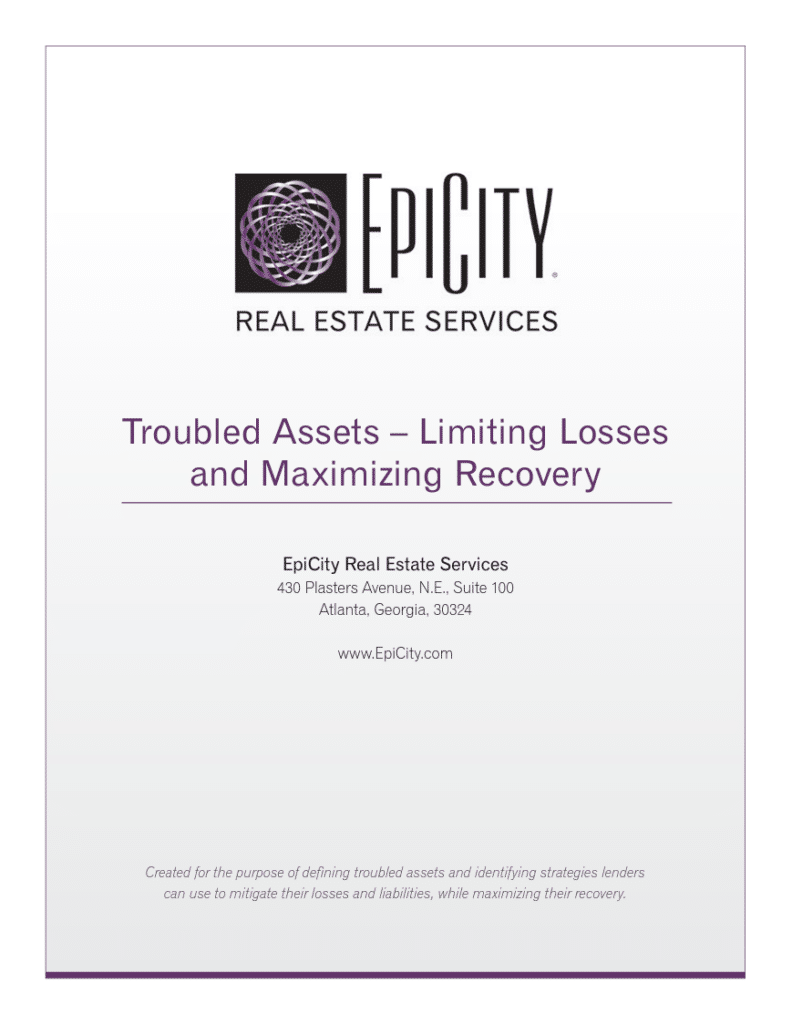Distressed Property Management: Limiting Losses & Maximizing Recovery
When a real estate investment becomes a financial burden, it runs the risk of becoming a distressed property. In cases of distressed properties, the investor is unable to make payments, and the property often falls into disrepair. Once payments lapse, the investor will enter either payment default or maturity default, and the bank will foreclose on the property.
While it may seem like the only way out is by taking a loss, distressed properties don’t have to result in serious losses or liabilities. In fact, prompt, strategic action can often save them. If your company is currently holding real estate that is in danger of becoming distressed, EpiCity would love to learn more about your situation and discuss a plan for distressed property management.

Download Our White Paper
Understanding the Consequences
If you face foreclosure, the main consequence is a substantial burden of time, money, and resources.In human effort alone, the bank assigns a to manage the case; an inspector must determine potential liabilities such as environmental contamination, life-safety hazards, and operational risks; and someone is also assigned to coordinate maintenance on the asset.
The goal when mitigating consequences is to quickly sell the property and recover the highest possible dollar amount. If a sale isn’t possible or minimally beneficial, lenders will sometime engage an outside company (such as EpiCity) to manage the distressed property. With emerging signs of a commercial real estate debt spiral, it is crucial to practice proactivity when it comes to turning around a distressed real estate investment.
When lenders and investors fail to appropriately manage their troubled assets, the financial consequences can be devastating. It’s critically important that you understand your options. While a foreclosure can sometimes save a portion of the investment, depending on the state of the asset, it can also result in greater liabilities. At times, the wise decision may be to simply walk away.
When to Get Help with Distressed Property Management
The earlier that you get help with distressed property management, the better. The difficulty lies in identifying that your property is headed toward a cycle of decline. Once the cycle of decline begins, it may be difficult or even impossible to steer yourself back on course. However, if you know what to look for, identifying the early warning signs becomes easier. The two main categories that you should pay attention to are the property itself and the tenants.
- Property Warning Signs: Be on the lookout for disheveled landscaping, neglected roofing, and dangerous walkways/stairways.
- Tenant Warning Signs: Be wary of high tenant turnover rate as well as an influx of less creditworthy tenants.
When it comes to real estate assets, no product type is immune from trouble. EpiCity has worked directly with private and institutional lenders as well as their borrowers to manage a wide variety of distressed properties including single-family homes, apartment communities, office buildings, warehouses, and self-storage facilities.
If you have a distressed property, no matter the type or condition, we can help. In fact, the more trouble you have, the more pronounced the benefits derived from EpiCity’s local, nimble, hands-on approach will be. For a quick chat, or to schedule a no-obligation assessment about a potentially troubled property, visit our contact page.
